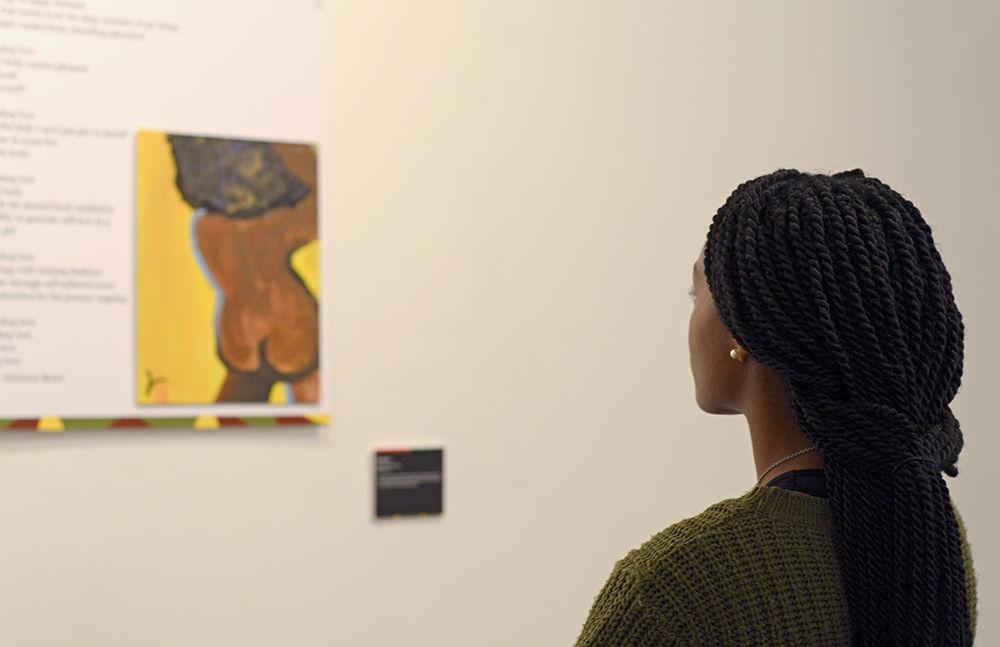 " />
" />
Swathi Karthik
Toinette Powers, a third-year majoring in international studies, looks at one of the pieces on display at the “Politicization and Sexualization of Black Bodies” art exhibit. The opening reception was held on Monday, Feb. 11 at the African American Cultural Center Witherspoon Art Gallery, and was hosted by the NC State Women's Center and the African American Cultural Center. The gallery features stories and paintings created by NC State students and staff.
Last Monday, Feb. 11, the African American Cultural Center (AACC) in Witherspoon Student Center was bustling with people and beloved cultural dishes, like plantains and beef patties, as it celebrated the opening of its new exhibit.
The exhibit, called “The Politicization and Sexualization of Black Bodies,” was a joint project by the Women’s Center and the AACC. It features an array of mostly student-made visual art and poetry and is located on the second floor of Witherspoon in the AACC Art Gallery.
Politicization refers to the attachment of political connotation to the existence of black people without their intent. Sexualization, especially of black women, has resulted in much of society refusing to attribute value to them outside of sexual attraction.
The idea originated from Angela Gay, the assistant director of the Women’s Center.
“We live in a society where even the hair on our head, whether it’s locs , an afro or we relax it, there’s some sort of message behind it that people politicize and say we’re not good enough,” Gay said.
Aside from her work with the Women’s Center, Gay is also a doctoral student studying critical race theory, and draws inspiration from this along with her life experiences.
“We wanted to talk about how our bodies are sexualized,” Gay said, “but we can’t talk about how they’re sexualized without talking about how they’re politicized.”
Staff behind the exhibit decided against photographing students’ bodies due to potential issues that may have arisen, so Gay decided to run with the two next best things: visual art and poetry.
Prior to the exhibit’s opening, the Women’s Center and AACC ran workshops where students could paint artwork and write poetry that would be featured. For many, it would be their first time attempting to work with these mediums.
“Not everyone considers themselves an artist,” Gay said. “It was a bit difficult getting through to them and teaching them that art is about what you create and how you tell your story, so that took a bit of ‘unlearning.’ That’s what we do in critical race theory: unlearn the parts of us that tell us we can’t do things.”
On opening night, once everyone had grabbed enough food and gotten settled, the event opened with a student-made video showing how the concepts that the exhibit focuses on are displayed in contemporary media. The video was followed by a poetry reading of “Need: A Chorale of Black Women’s Voices”, written by Audre Lorde, performed by three other students.
After applause was given for both portions, Gay and John Miller, program coordinator at the AACC, opened the floor for a reflection from Zakiya Covington, assistant student coordinator of the Women’s Center.
“My black body – a body that society has deemed undesirable, unimportant and every other ‘un’ you could think of – holds so much power,” Covington said. “Our counter-narratives can create space for real people and their experiences in celebration of what it means to be more than a body in a historically white institution.”
When Covington finished her address, the final portion of the night began: a keynote address from Toni “Mama” Thorpe, the former program coordinator of the AACC. She appeared by special request from both the Women’s Center and AACC.
“Normally, black women get to hear the conversation, but not take part in it,” Thorpe said. “Being able to stand here and say whatever I want is a debt I don’t take lightly.”
Thorpe relayed to the audience her experiences growing up, everything that helped her come to terms with her being and how she learned to talk about them.
“It’s very important that we learn to tell our stories and who we need to tell them to,” Thorpe said. “Until the lion has its own historian, the tale of the hunt will always glorify the hunter.”
Thorpe received a round of applause, and afterward everyone in the conference room proceeded to go downstairs to see the exhibit, grabbing leftover food on the way. While guests admired the pieces, students from the AACC serenaded the audience with a drum performance.
Next to the exhibit, a recording crew set up equipment to film students for Wolf Tales, a service dedicated to archiving the experiences of current and former students. That evening, students were encouraged to share what they learned during the keynote as well as contribute their own experiences. Footage recorded there is expected to be released in the summer.
The exhibit is scheduled to be up until March 21, 2019. It is free to be viewed by all, and programs centered around its content can be set up by getting in contact with the Women’s Center at womens-center@ncsu.edu